As the United States begins to recover from the disruption created by the COVID-19 pandemic, it's time to focus on the long-term impacts of changing social practices and economic harm. The harsh reality of COVID is that it has disproportionately impacted underserved communities. In Massachusetts, without a concerted effort on the part of policy and healthcare workers, those impacts may continue to grow over the coming months and years. In particular, experts say food insecurity and healthcare access must become focal points of successful, long-term recovery plans.
As part of the [**Hunger to Health Collaboratory**](https://www.hungertohealthcollaboratory.org/), the Museum of Science has convened a panel of experts to discuss COVID in our communities. Dr. Kara Miller, host of the radio show [**Innovation Hub**](http://blogs.wgbh.org/innovation-hub/2011/1/1/about-innovation-hub/) from WGBH and PRX, moderates a discussion with Catherine D’Amato, President and CEO of the Greater Boston Food Bank, Dr. Holly Oh, Chief Medical Director at the Dimock Health Center, and Marty Martinez, Chief of the Mayor’s Office of Health and Human Services for the city of Boston. They discuss concerns surrounding food insecurity, healthcare access, and other issues that will arise in our most vulnerable neighborhoods while living in COVID times.
Also, the Museum of Science is offering free virtual programming daily from live presentations, virtual exhibits, STEM activities, and more. Please visit https://mos.org/mos-at-home for our virtual offerings.
Partner:
Museum of Science, Boston
